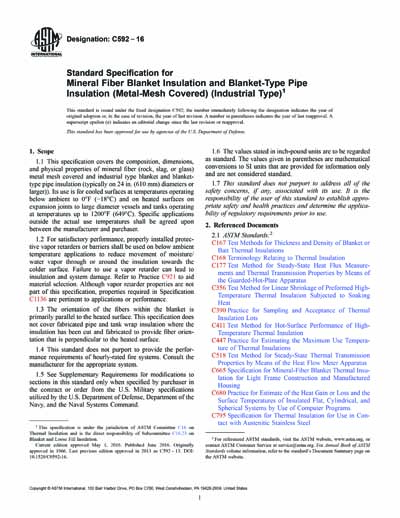Historical
ASTM C592-16
Standard Specification for Mineral Fiber Blanket Insulation and Blanket-Type Pipe Insulation (Metal-Mesh Covered) (Industrial Type)
1.1 This specification covers the composition, dimensions, and physical properties of mineral fiber (rock, slag, or glass) metal mesh covered and industrial type blanket and blanket-type pipe insulation (typically on 24 in. (610 mm) diameters or larger)). Its use is for cooled surfaces at temperatures operating below ambient to 0°F (−18°C) and on heated surfaces on expansion joints to large diameter vessels and tanks operating at temperatures up to 1200°F (649°C). Specific applications outside the actual use temperatures shall be agreed upon between the manufacturer and purchaser.
1.2 For satisfactory performance, properly installed protective vapor retarders or barriers shall be used on below ambient temperature applications to reduce movement of moisture/water vapor through or around the insulation towards the colder surface. Failure to use a vapor retarder can lead to insulation and system damage. Refer to Practice C921 to aid material selection. Although vapor retarder properties are not part of this specification, properties required in Specification C1136 are pertinent to applications or performance.
1.3 The orientation of the fibers within the blanket is primarily parallel to the heated surface. This specification does not cover fabricated pipe and tank wrap insulation where the insulation has been cut and fabricated to provide fiber orientation that is perpendicular to the heated surface.
1.4 This standard does not purport to provide the performance requirements of hourly-rated fire systems. Consult the manufacturer for the appropriate system.
1.5 See Supplementary Requirements for modifications to sections in this standard only when specified by purchaser in the contract or order from the U.S. Military specifications utilized by the U.S. Department of Defense, Department of the Navy, and the Naval Systems Command.
1.6 The values stated in inch-pound units are to be regarded as standard. The values given in parentheses are mathematical conversions to SI units that are provided for information only and are not considered standard.
1.7 This standard does not purport to address all of the safety concerns, if any, associated with its use. It is the responsibility of the user of this standard to establish appropriate safety and health practices and determine the applicability of regulatory requirements prior to use.
ASTM International [astm]

